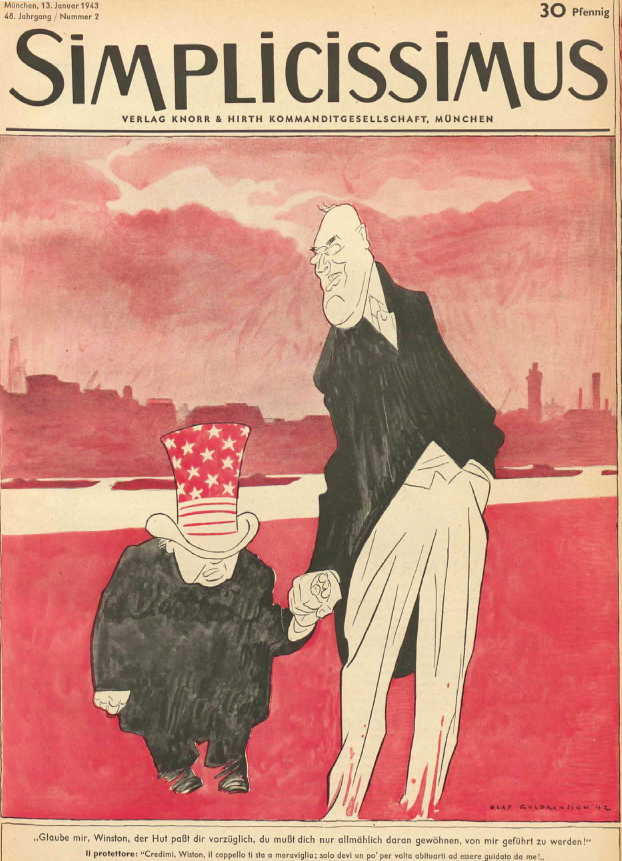
Background: Nazi propaganda on Winston Churchill followed a trajectory. Before the war began he was a relatively minor figure, appearing only when he made the news for calling attention to German rearmament. Between the outbreak of the war and his appointment as prime minister, he was a bumbling clown, the hapless victim of German military brilliance. Between May 1941 and the invasion of the Soviet Union, he was the prime enemy, the person standing between Germany and a just peace. For the remainder of the war, he was the puppet of Stalin and Roosevelt and the Jews who stood behind them. The images on this page come from a range of sources. Click on images to get larger versions.
My 2009 essay on the subject in Finest Hour, the monthly of the Churchill Center, is available on-line.
Winston Churchill in Nazi Propaganda
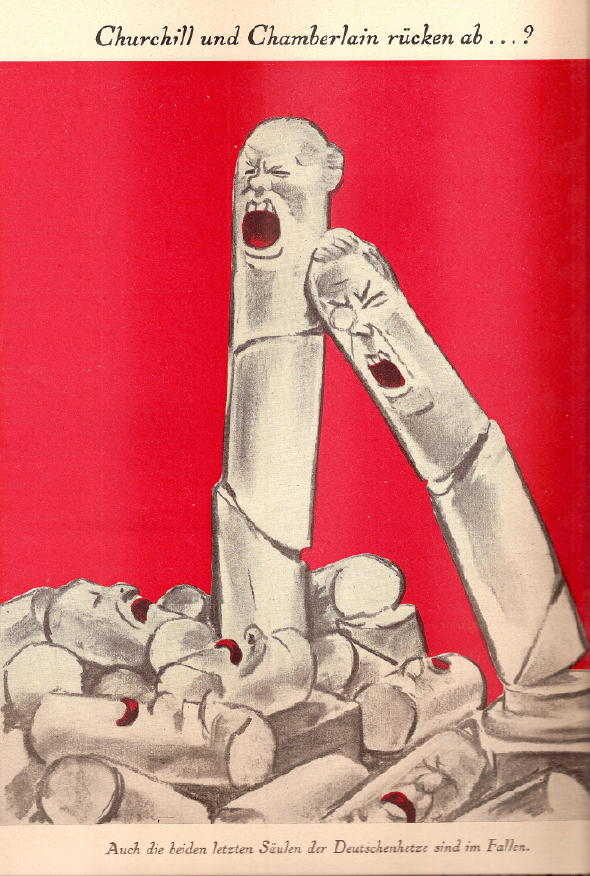
This 1933 cartoon is from the weekly Nazi humor magazine. The caption: “Churchill and Chamberlain withdraw...? The last two pillars of agitation against Germany are collapsing.”
Source: Brennessel, #41/1933
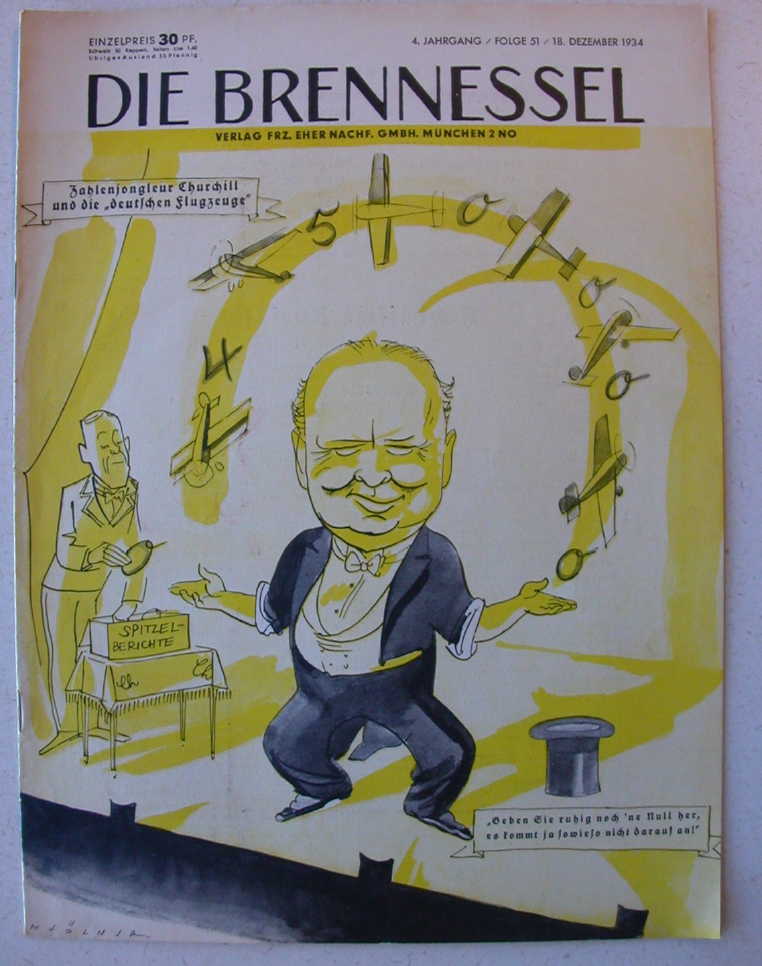
This December 1934 cartoon accuses Churchill of fabricating figures on German rearmament. The caption: “Winston Churchill juggles figures on ‘German aircraft’: ‘Toss me another zero — it won’t make much of a difference.’”
Source: Brennessel, #51/1934
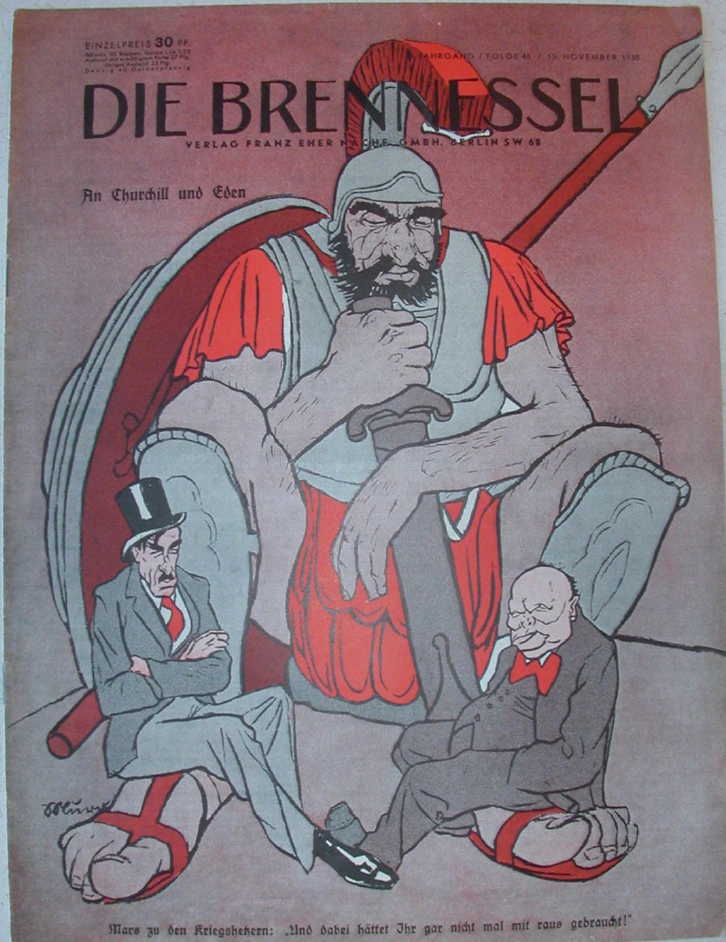
Brennessel ceased publication in 1938. This was its last cover cartoon featuring Churchill. Mars is speaking to the “warmongers” Eden and Churchill, who had been objecting to Chamberlain’s appeasement policies.
Source: Brennessel, #46/1938
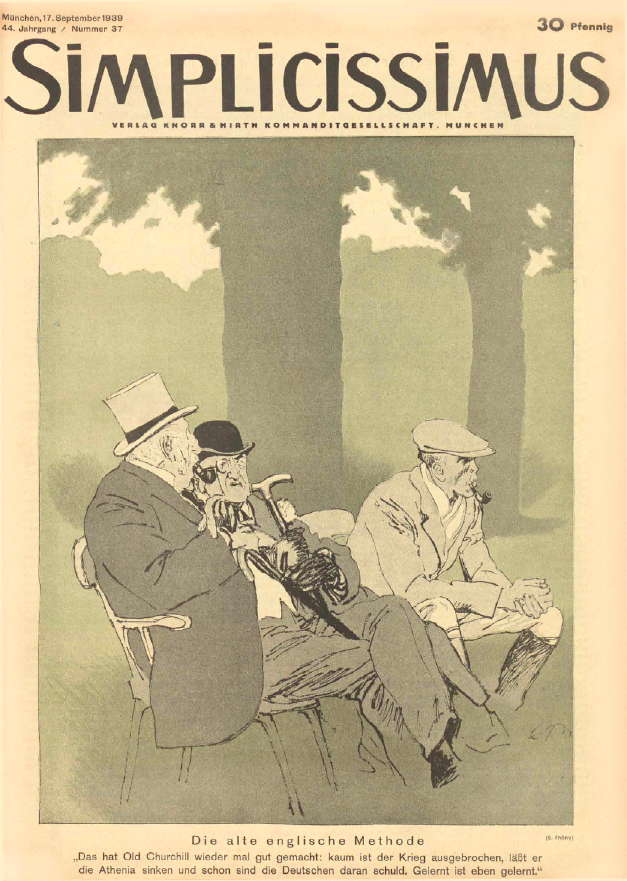
This September 1939 cover from Simplicissimus, another weekly humor magazine, is titled “The old English methods.” One Englishman says: “Churchill has done good work again. The war has hardly begun and he has the Athenia sunk, and he blames the Germans for it. He’s had a lot of practice.” A German U-boat had actually sunk the Athenia, though the Germans did not know that until the sub returned to port.
Source: Simplicissimus, #37/1939. I take this from the on-line collection of Simplicissimus.
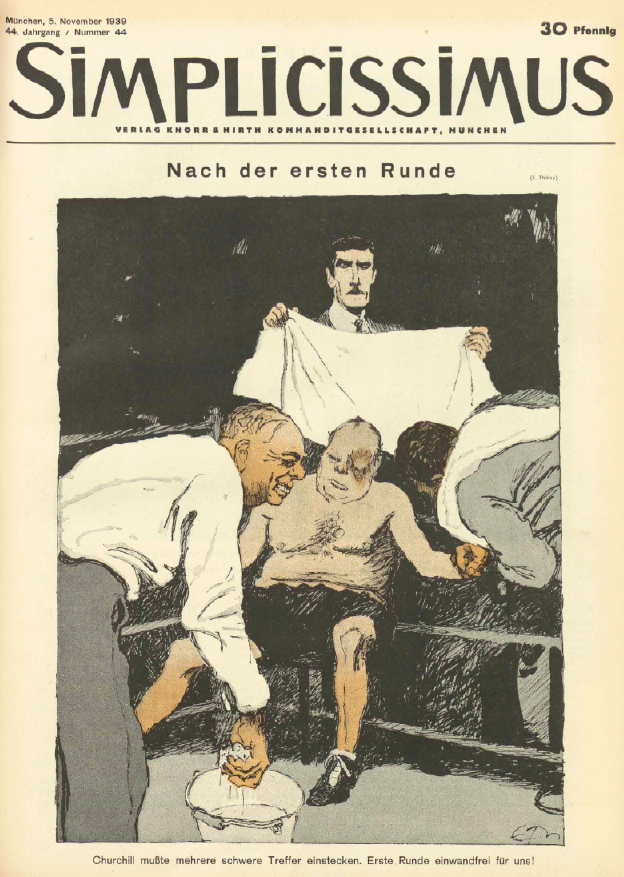
In November 1939, Simplicissimus portrayed Churchill as a boxer: “Churchill had to take many hard blows. We clearly won the first round!” Churchill was First Lord of the Admiralty at this point, and the British had suffered serious losses.
Source: Simplicissimus, #44/1939. I take this from the on-line collection of Simplicissimus.
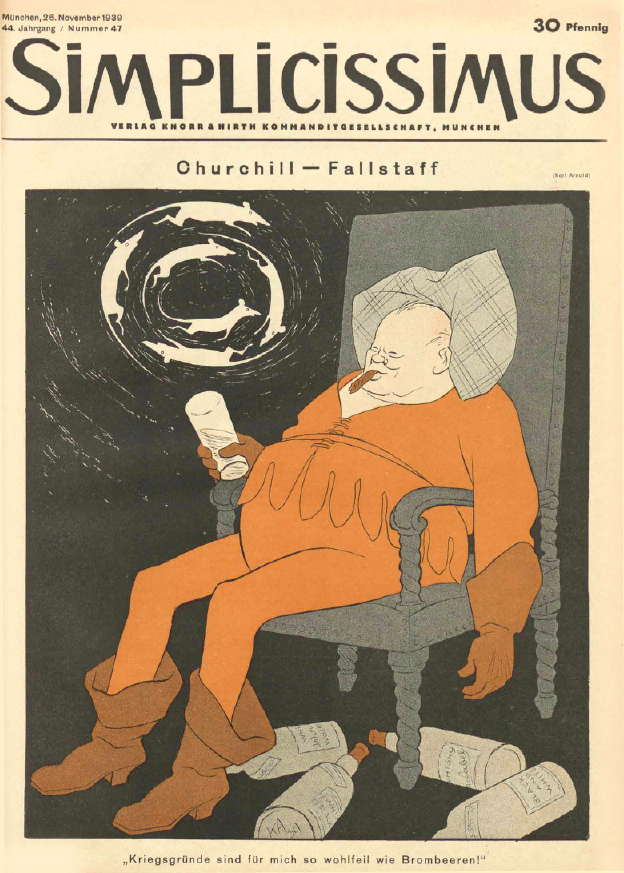
Also in November 1939, Simplicissimus portrayed Churchill as Falstaff, surrounded by empty bottles of alcohol: “Reasons for war are as cheap as blackberries for me!” The point is that Churchill had wanted war.
Source: Simplicissimus, #47/1939. I take this from the on-line collection of Simplicissimus.
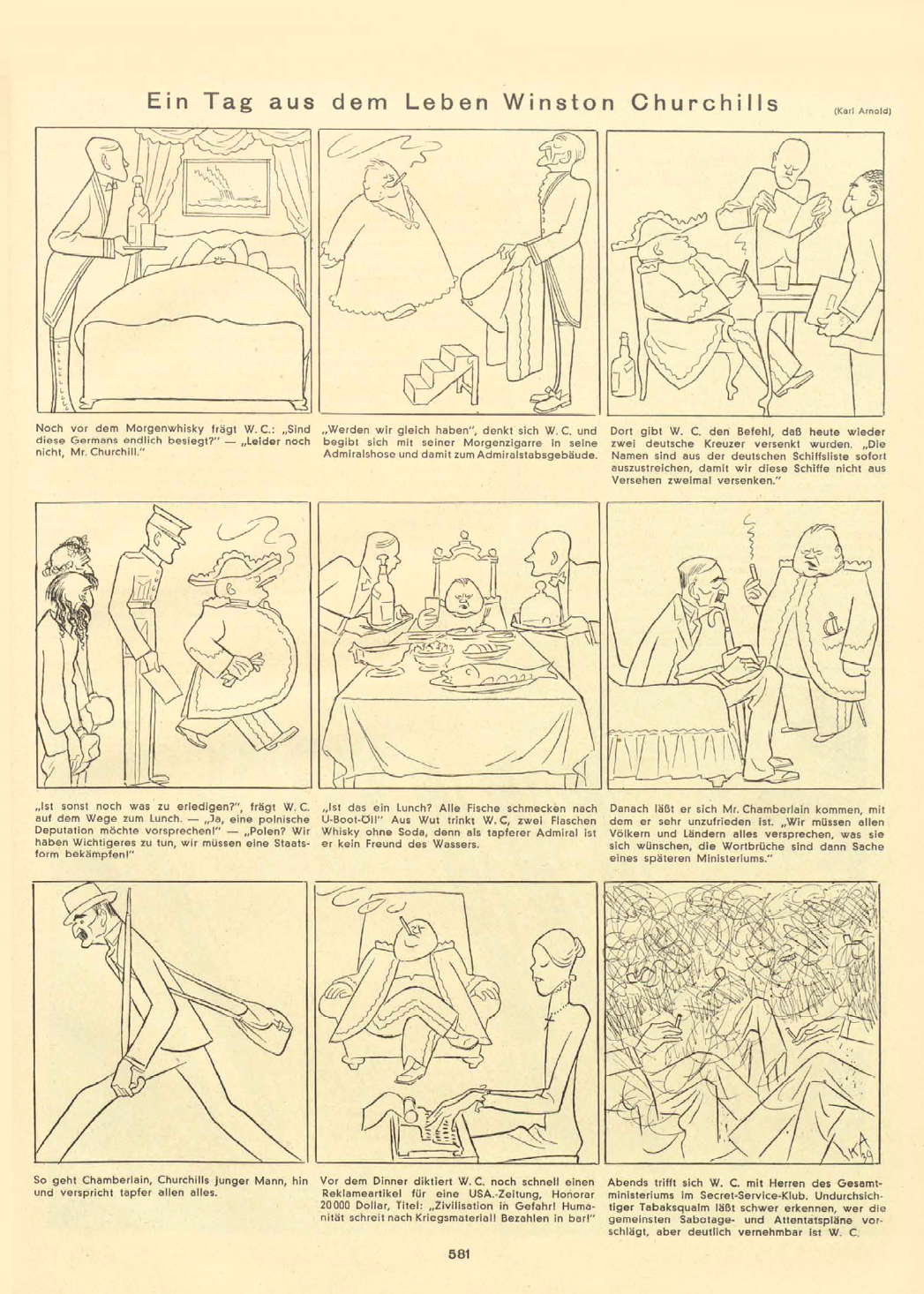
This interior cartoon from December 1939 portrays “A day in the life of Winston Churchill.” The nine frames: (1) Even before his morning whiskey, Churchill asks if the Germans have been defeated yet, and is told unfortunately not. (2) Churchill thinks it will happen soon enough, as he dons his admiralty pants and heads to the Admiralty while smoking his cigar. (3) He orders that two German cruisers be listed as sunk, being sure to cross the names off the list so the same ship is not listed as being sunk twice. (4) As he heads to lunch, Churchill has no time to meet a delegation of Poles. (5) At lunch, he is angry because the fish taste like U-boat oil. He drinks two bottles of whisky, since as a brave admiral he is no friend of water. (6) Talking to Chamberlain, he says they should promise other countries whatever they want, since a later government will deal with the broken promises. (7) Chamberlain leaves, promising to follow Churchill’s orders. (8) Before dinner, he dictates an article for an American magazine, and earns $20,000. The title: “Civilization in danger! Humanitarianism cries out for war material. Paying cash!” (9) In the evening, he meets others at the Secret Service Club to plan sabotage and assassinations.
Source: Simplicissimus, #49/1939. I take this from the on-line collection of Simplicissimus.
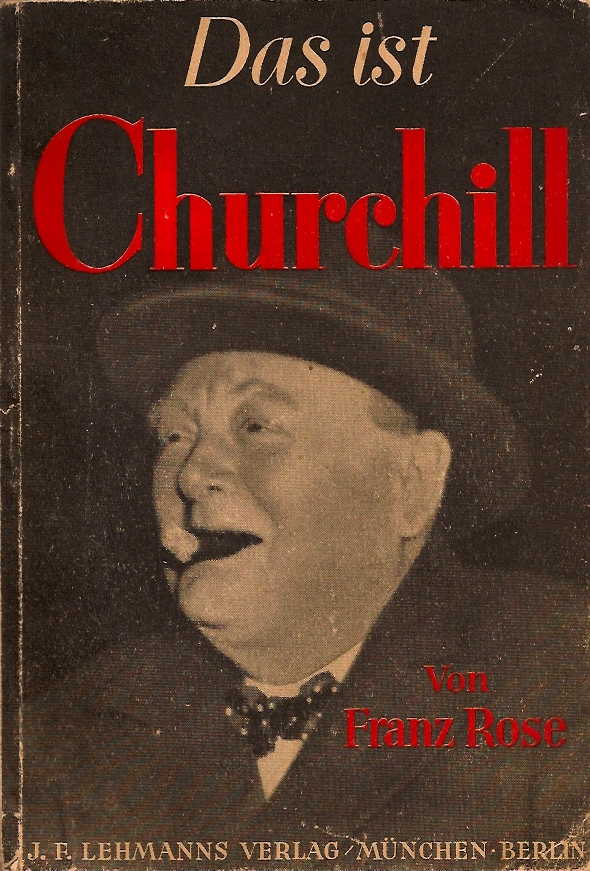
This pamphlet, published early in the war, found a rather unflattering photograph of Churchill for the cover.
Source: Franz Rose, Das ist Churchill (Munich: J. F. Lehmanns Verlag, 1940).
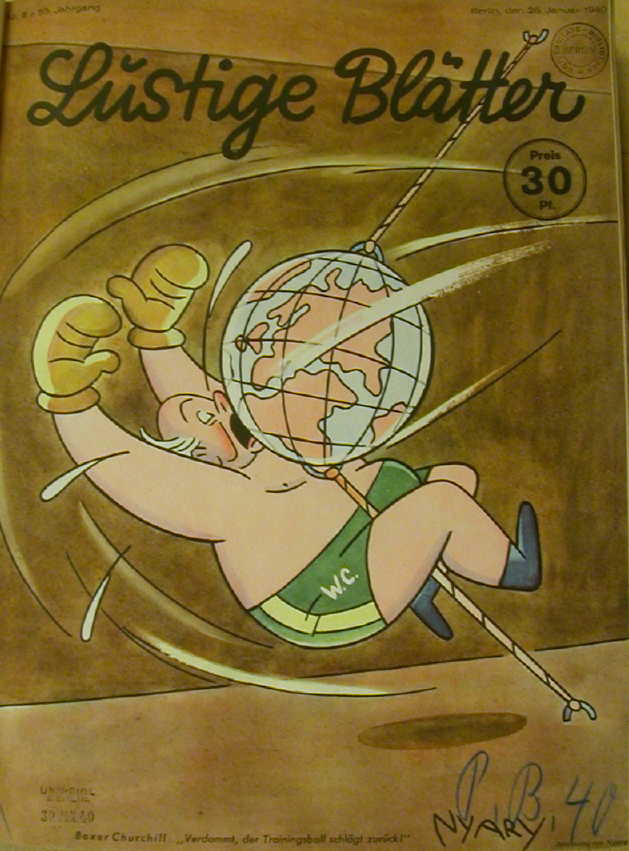
In this January 1940 cartoon, Churchill loses a boxing match with the world. The caption: “Damn! The training ball fights back.”
Source: Lustige Blätter, #5/1940
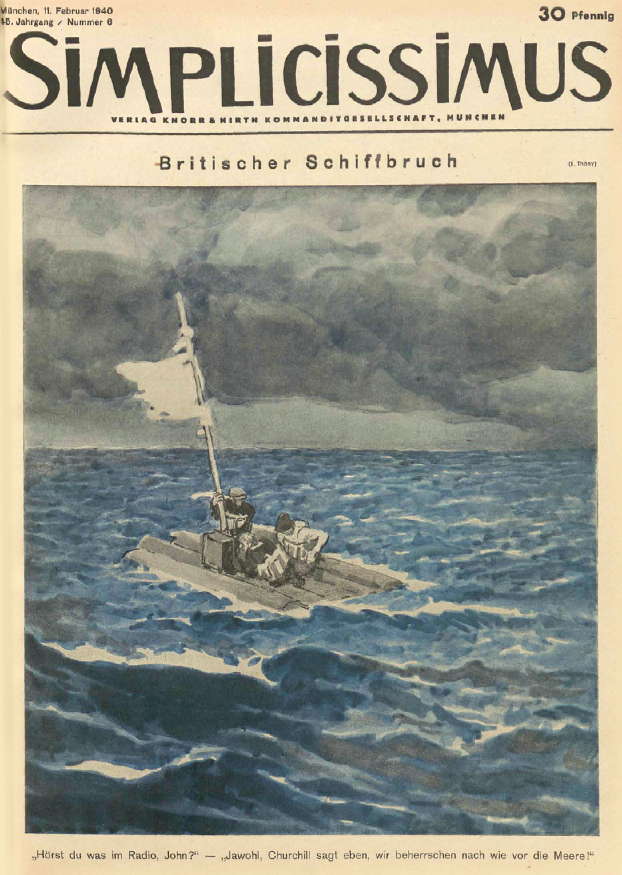
In February 1940, this conversation occurs: “‘Anything on the radio, John?’ ‘Yes, Churchill says that we still rule the waves.’”
Source: Simplicissimus, #6/1940. I take this from the on-line collection of Simplicissimus.
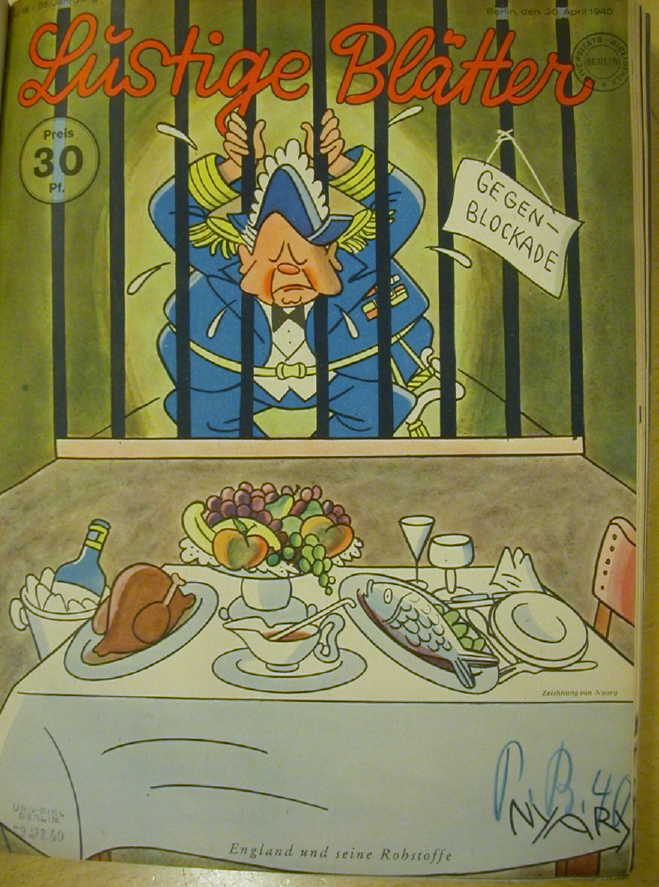
In this spring 1940 cartoon from Lustige Blätter, a weekly humor magazine, a comical Winston Churchill is behind bars looking at a well-stocked table that he is unable to reach because of the German submarine blockade. The caption: “England and its raw materials.”
Source: Lustige Blätter, #18/1940
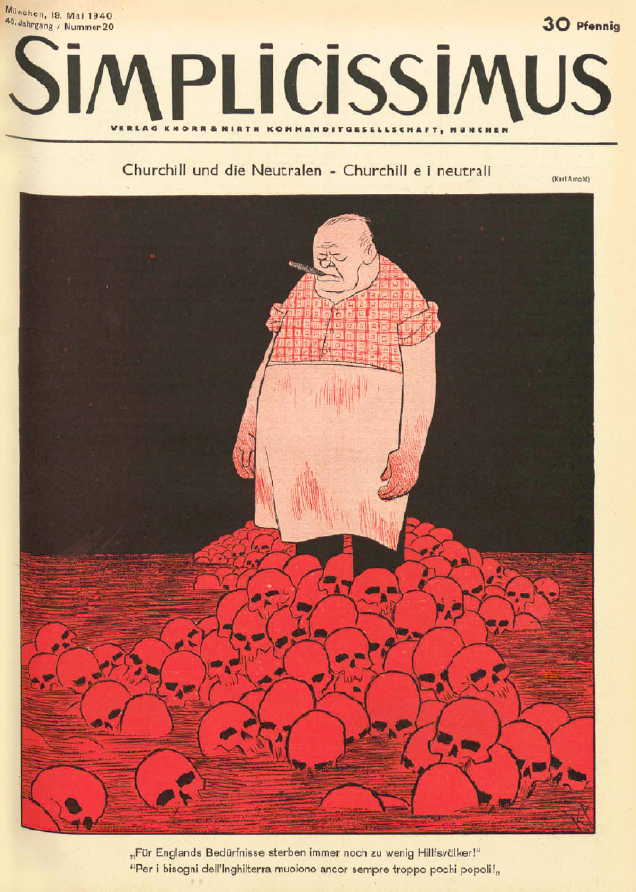
In this spring 1940 cartoon from Simplicissimus, another weekly humor magazine, Winston Churchill stands on the skulls of England's former allies. The caption: “Churchill and the neutrals: ‘There are still not enough vassal peoples dying for England.’”
Source: Simplicissimus, #20/1940. I take this from the on-line collection of Simplicissimus.
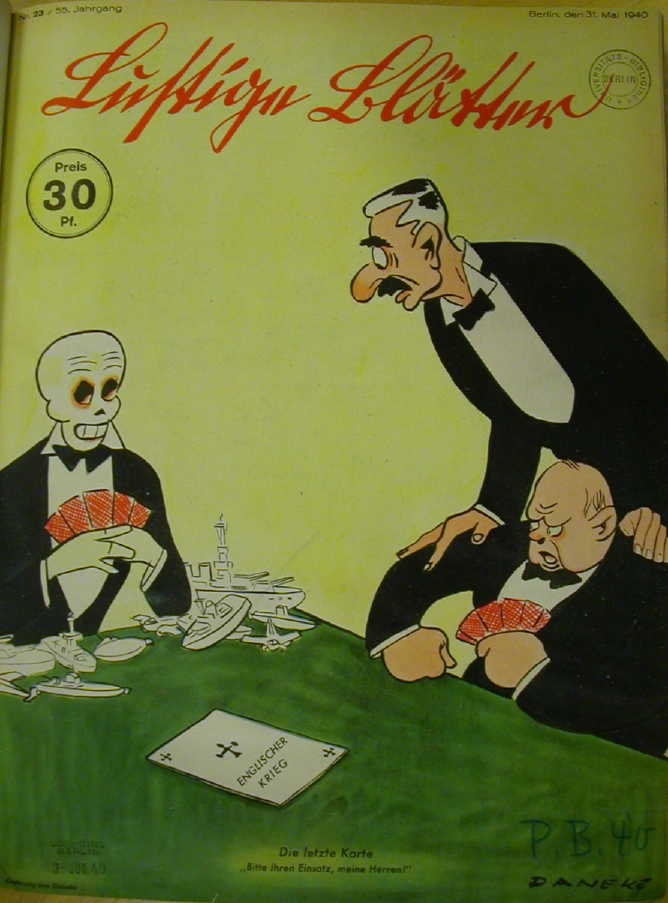
At the end of May 1940, Lustige Blätter ran this cartoon. Churchill and Eden are playing cards with Death, who is clearly winning. The caption: “The last card: ‘Your play, gentlemen.’”
Source: Lustige Blätter, #23/1940
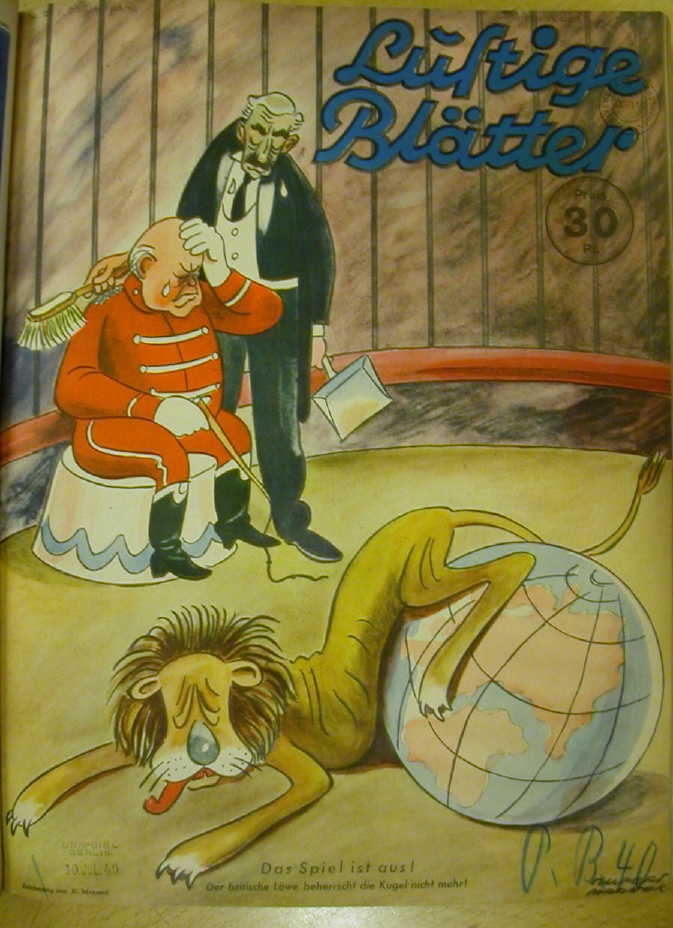
In June 1940, it seems reasonable to Germans that England is finished. The caption: “The game is over. The British lion no longer rules the world.”
Source: Lustige Blätter, #28/1940
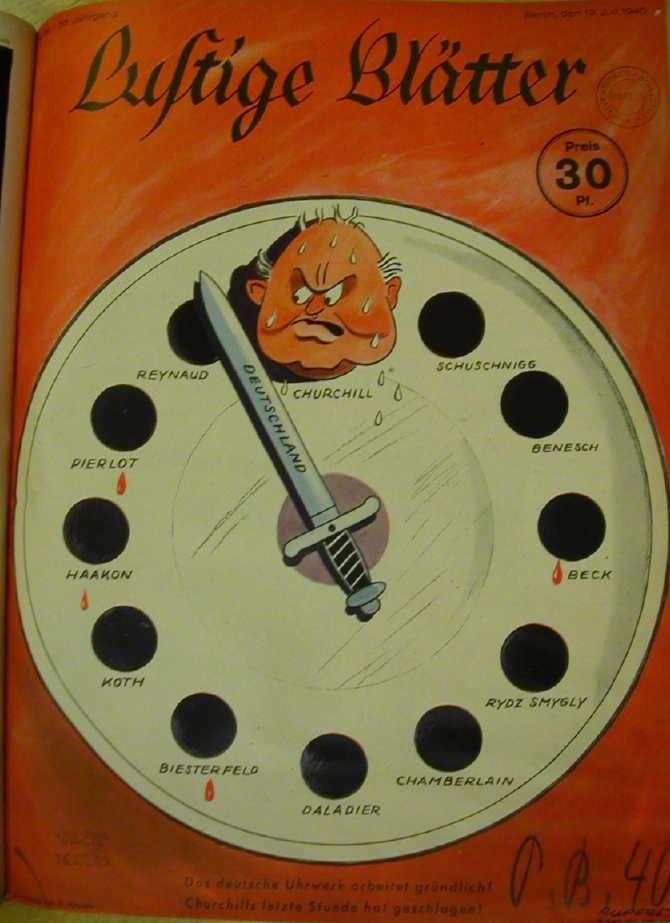
In this July 1940 cartoon, Churchill awaits beheading by Germany's sword. His will be the last head to fall. The other slots, now dripping with the blood of defeated Nazi enemies, include former leaders of Poland, Czechoslovakia, France, and England.
Source: Lustige Blätter, #30/1940
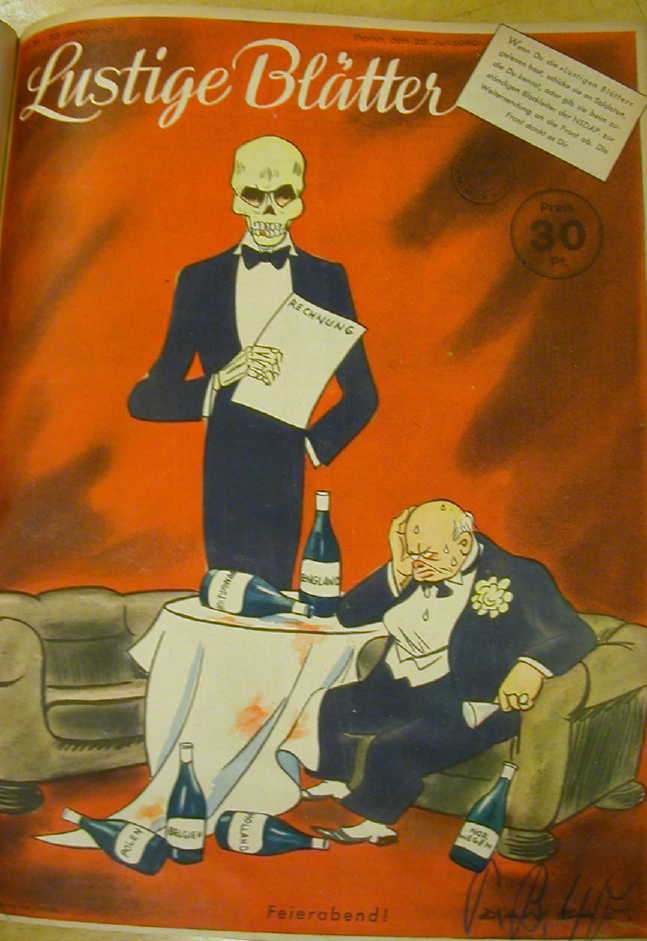
The next issue of Lustige Blätter had Churchill getting the bill from Death for his “holiday.” The empty bottles are named Poland, Norway Belgium, Holland, and England.
Source: Lustige Blätter, #31/1940
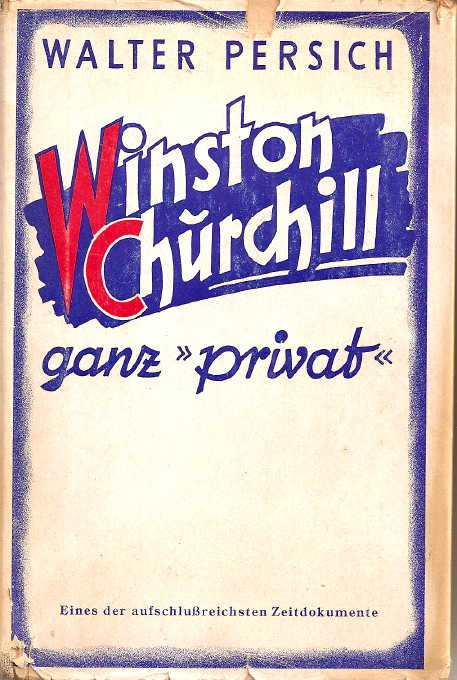
In the summer of 1940, Walter Persich published his biography of Winston Churchill titled The “Private” Winston Churchill: Adventurer, Lord and Criminal. As one would expect, Churchill does not come out well. The book ends:
“The end may come too soon for Churchill. For his people, who chose this man and were willing to led by his spirit, which can only find peace in confusion, there will be a bitter end — for Churchill’s debts and England’s debts are the same, and both accounts have swollen enormously. Nothing can eliminate these facts from the world, for facts cannot be washed away by the blood of millions, nor by the tears of those who sorrow.
Only deeds can overcome them. They alone speak.”
Source: Winston Churchill ganz “privat.” Abenteurer, Lord und Verbrecher (Berlin: Otto Schaffer, 1940).
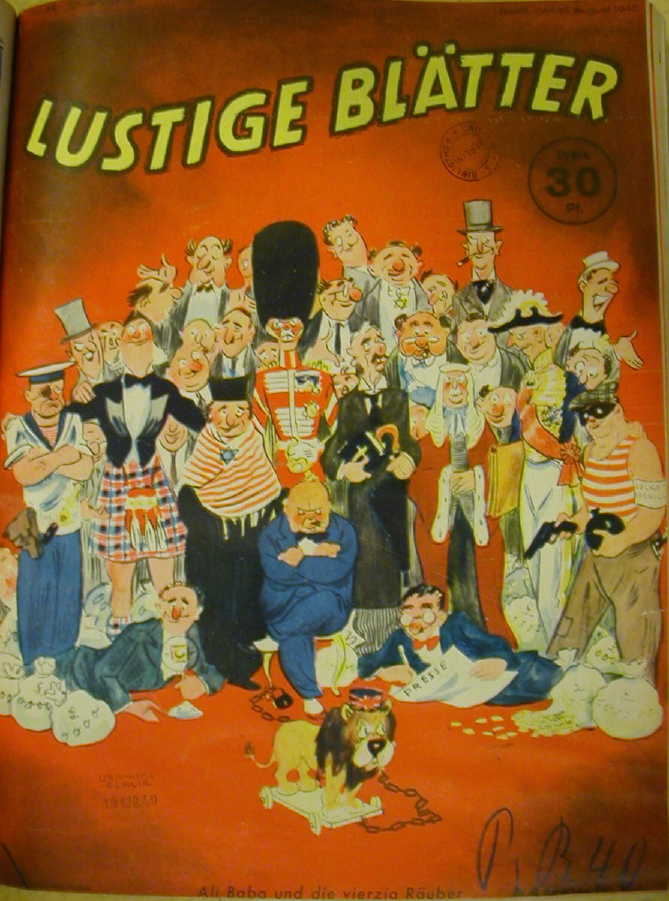
In this August 1940 a cartoon titled “Ali Baba and the 40 Thieves,” Churchill is surrounded by an interesting collection of his accomplices: priests, Jews, plutocrats, crooks, and more.
Source: Lustige Blätter, #34/1940
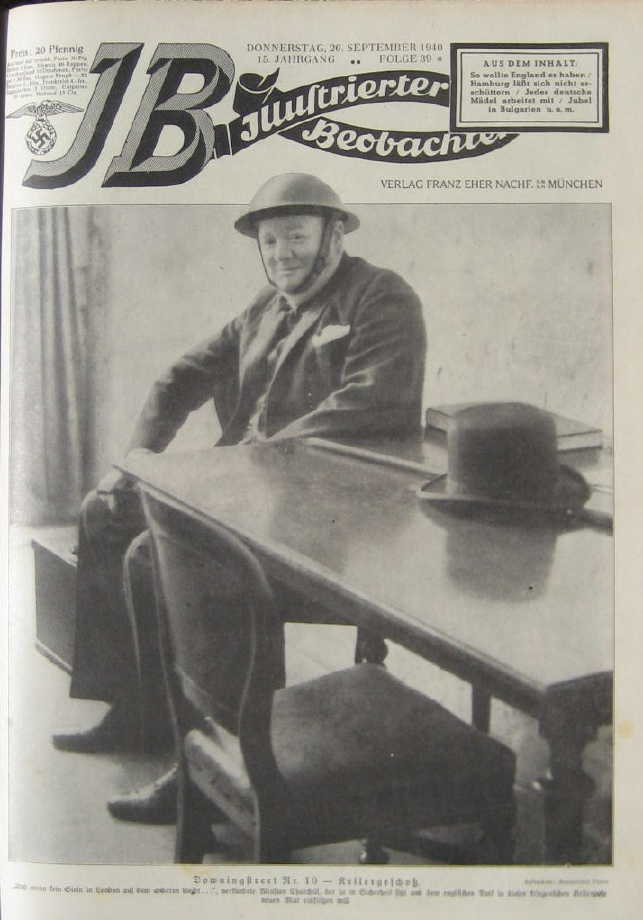
In a September 1940 cover of the Illustrierter Beobachter, the Nazi Party's weekly illustrated magazine, Churchill sits in the basement of Nr. 10 Downing Street. The caption announces that he is trying to give fresh courage to the English from his “safe military post” in the basement.
Source: Illustrierter Beobachter, #39/1940
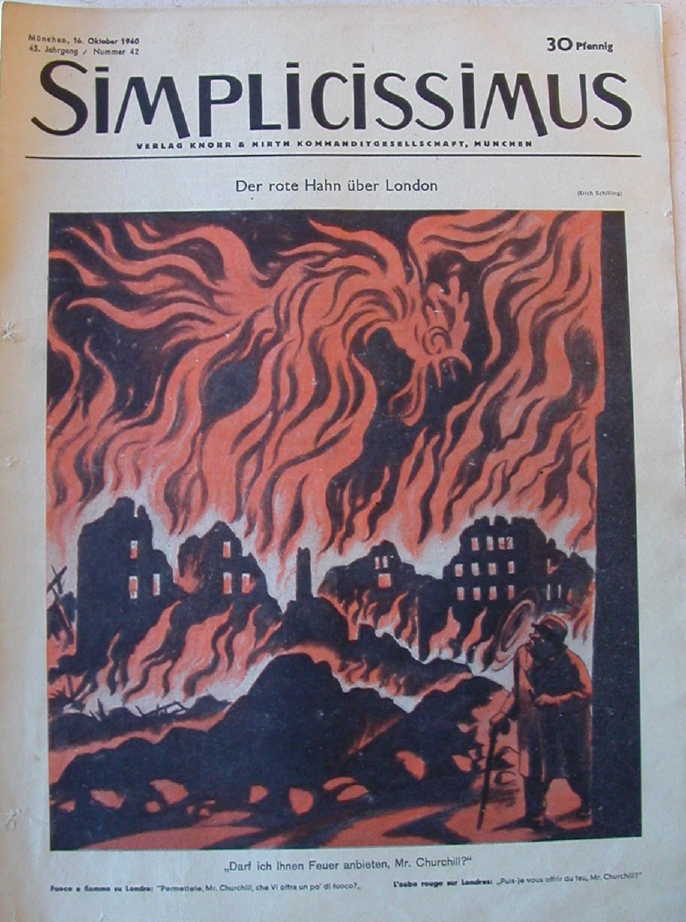
In an October 1940 cartoon from Simplicissimus. The caption: “Red rooster over London. ‘May I offer you a light, Mr. Churchill?’”
Source: Simplicissimus, #42/1940
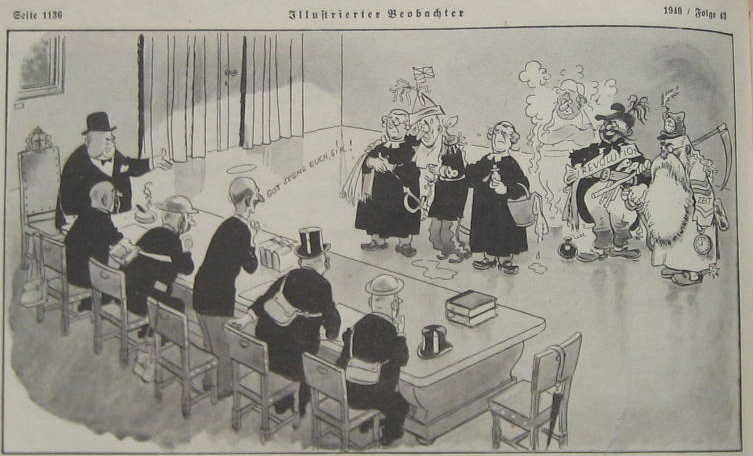
From the same issue, the Nazis often made a point of accusing Churchill of being a drunkard. The accompanying text to this October 1941 cartoon: “We knew the old liar drank a lot, but now we know just how much: ‘He begins the morning with a sherry, then has a bottle of Burgundy with lunch. He often has a glass of port after lunch, but always one after dinner. There is whiskey in the afternoon and Champagne with dinner. Then some more port, and a glass of Cognac. As the night goes on, a whiskey and soda...’” This is apparently taken from an English article.
Source: Illustrierter Beobachter, #43/1940
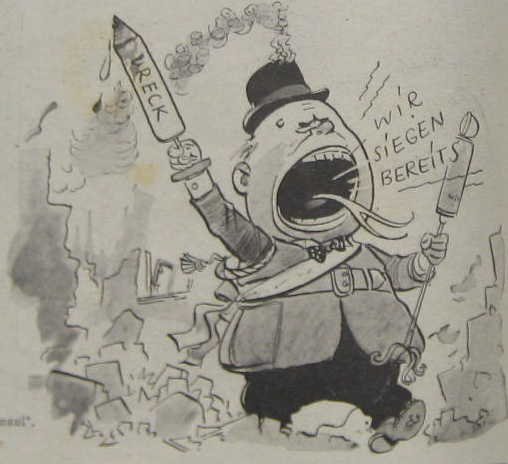
In a cartoon from the same issue, Churchill walks through the ruins of a British city shouting “We’re winning!” He is spreading filth with the sprayer.
Source: Illustrierter Beobachter, #43/1940
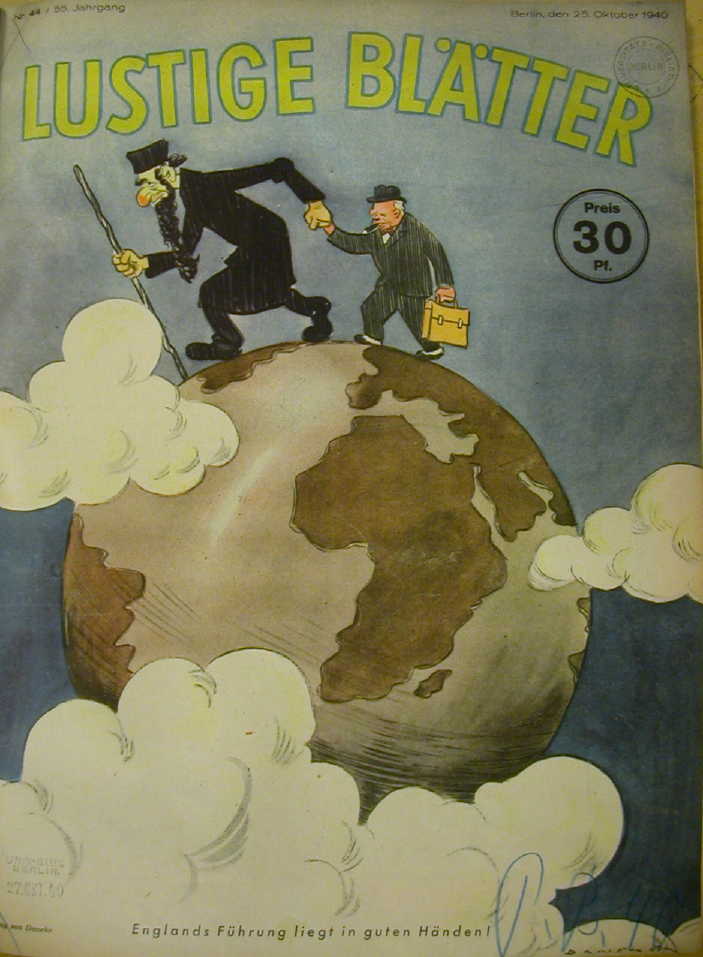
“England’s future is in good hands,” this cartoon claims. Churchill is being led about the world by Ahasver, the legendary “Wandering Jew.”
Source: Lustige Blätter, #44/1940
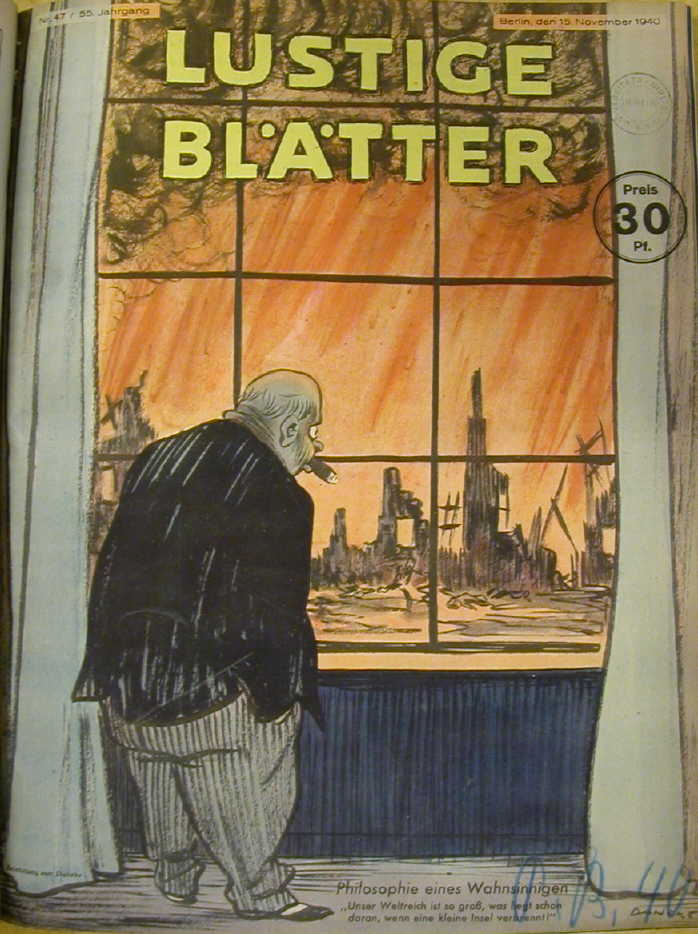
The same theme from Lustige Blätter. Churchill looks out his window at a ruined London. The caption: “The philosophy of a madman: ‘Our Empire is so large that it hardly makes a difference if a small island burns’”
Source: Lustige Blätter, #47/1940
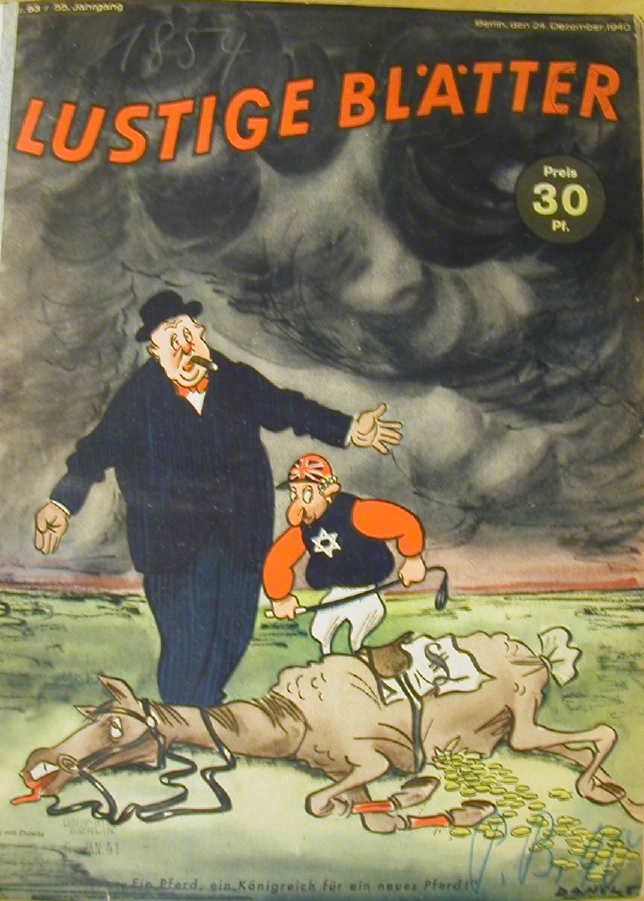
Churchill, standing over a dead horse and next to its Jewish jockey, says: “A horse, a horse, my kingdom for a horse!”
Source: Lustige Blätter, #53/1940
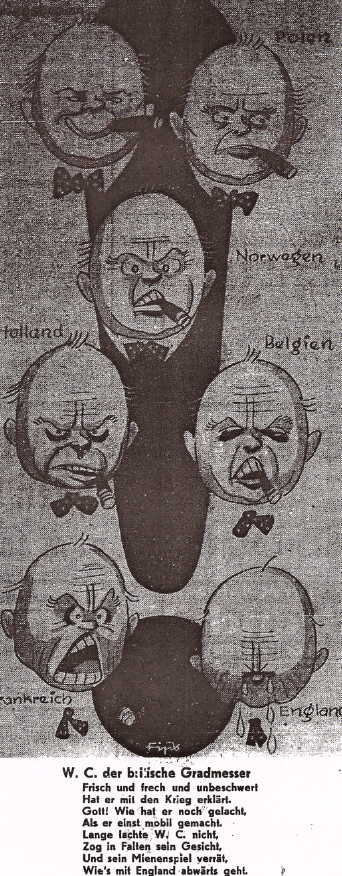
In this January 1941 cartoon from Julius Streicher's anti-Semitic weekly Der Stürmer, Churchill’s expression grows unhappier with each new country that falls to Germany.
Source: Der Stürmer, #1/1941
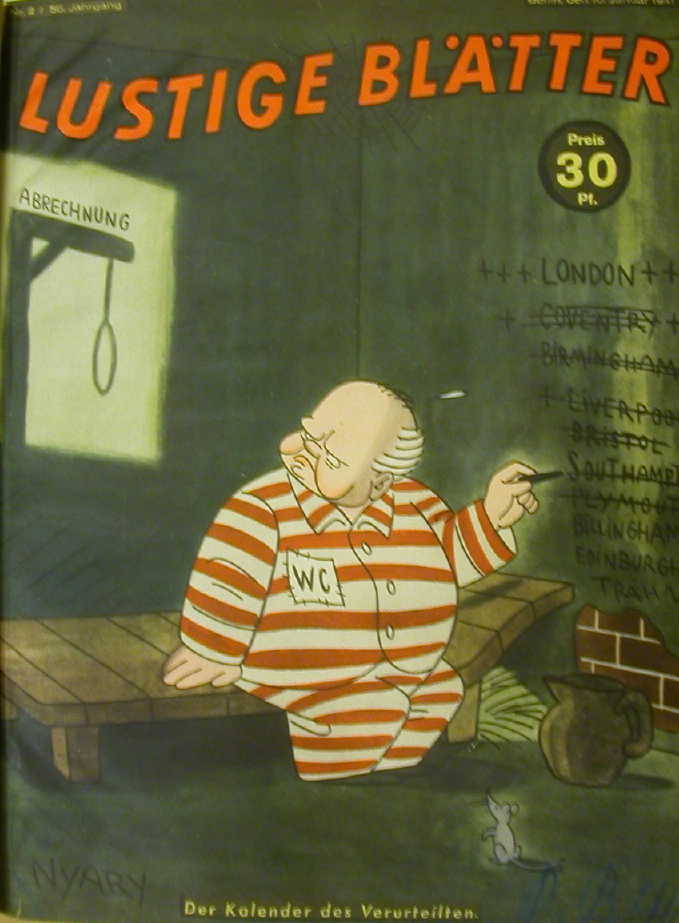
In this January 1941 cartoon, Churchill sits in a prison cell awaiting hanging. He is crossing off the names of cities destroyed by German bombing. The caption: “The calendar of a condemned man.”
Source: Lustige Blätter, #1/1941
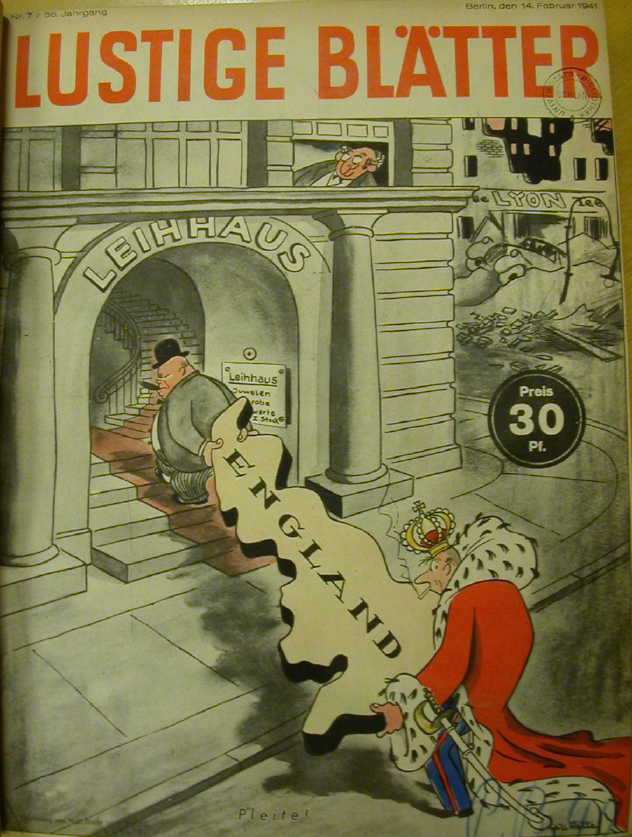
In this February 1941 cartoon, Churchill and the king are hauling England in to a Jewish pawn shop. The point is that Churchill was squandering the British Empire in a vain effort to defeat Germany.
Source: Lustige Blätter, #7/1941
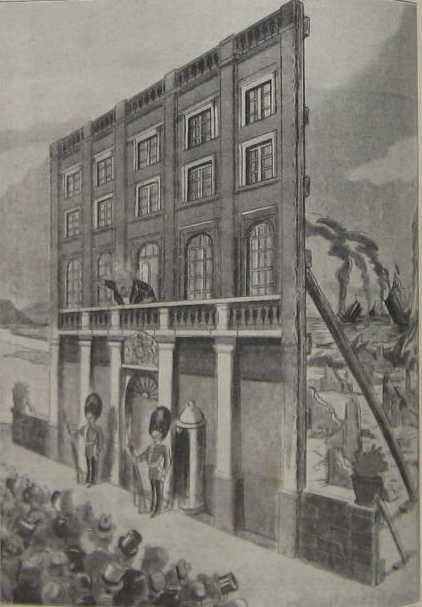
In a March 1941 cartoon from the Illustrierter Beobachter, taken from an Italian newspaper, Churchill gives a speech. The caption: “Churchill’s last speech from the front of the facade.”
Source: Illustrierter Beobachter, #12/1941
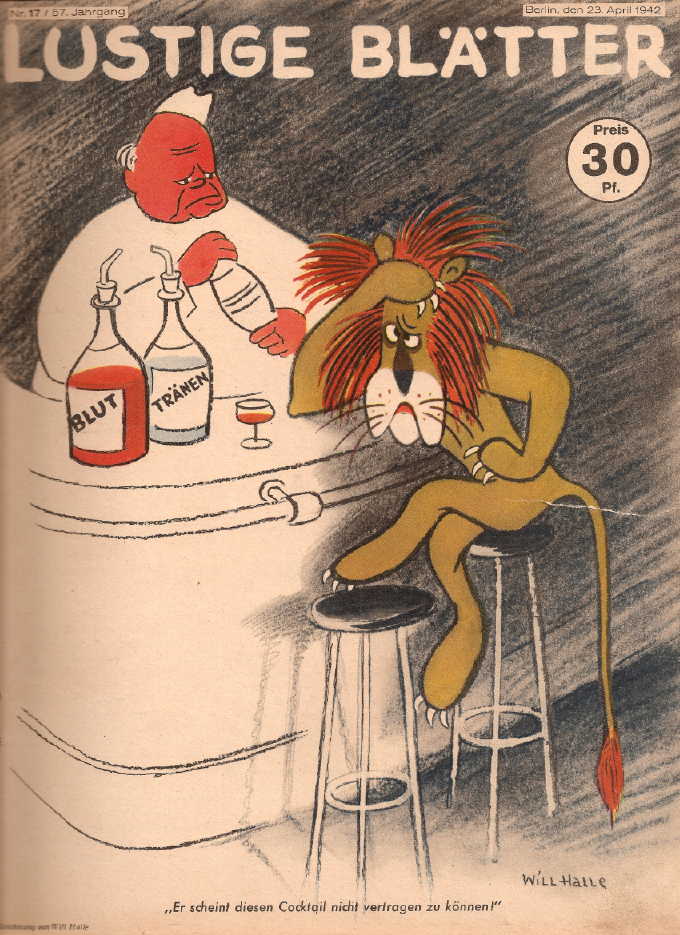
About the time this cartoon appeared, Joseph Goebbels had talked with his colleagues about how Churchill’s famous promise had worked. If things get worse, Churchill could say that’s just what he had predicted; if they got better, he could take credit. In this cartoon, the British lion is suffering after a cocktail of blood, sweat, and tears. The caption: “This cocktail doesn't seem to agree with him.”
Source: Lustige Blätter, #17/1941
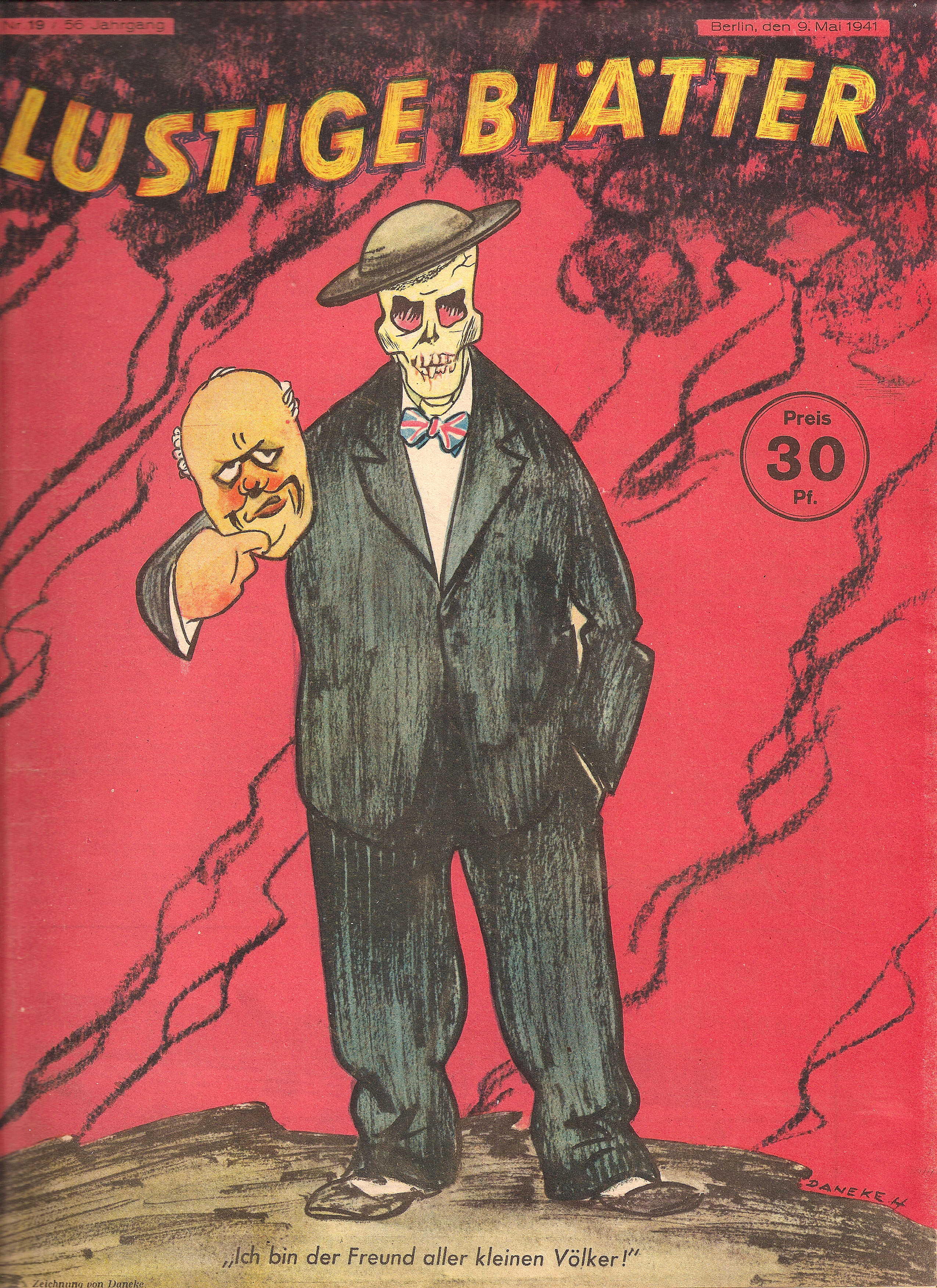
In May 1941, Death wears a Churchill mask. The caption: “I am the friend of all the little nations.”
Source: Lustige Blätter, #19/1941
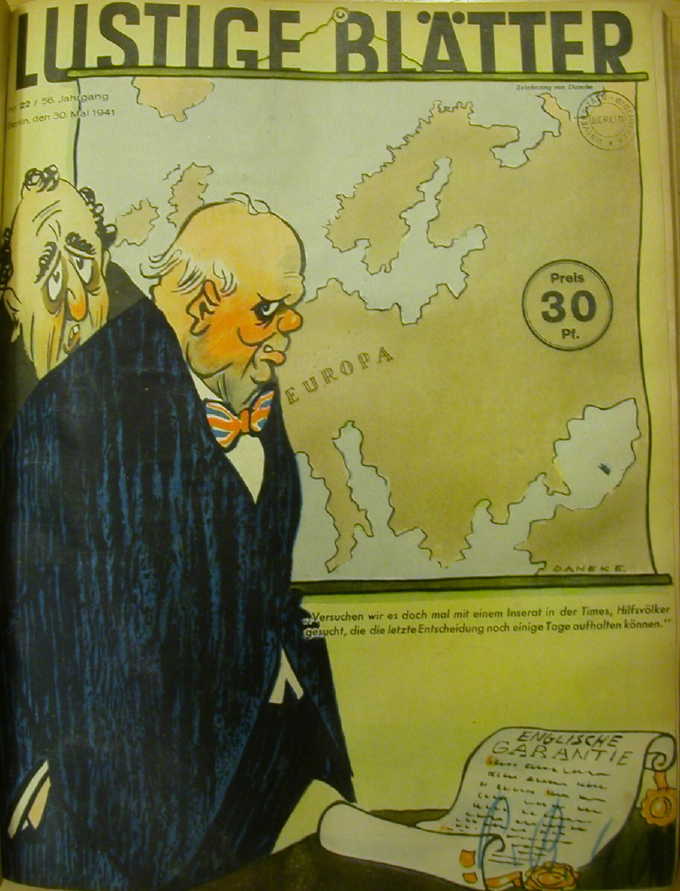
In May 1941, a month before the invasion of the Soviet Union, Churchill and the Jew behind him contemplate what to do, now that Yugoslavia and Greece have fallen to the Nazis. The caption: “Let’s try an ad in the Times. Maybe we can find some other nations to hold thing off for a few days.”
Source: Lustige Blätter, #22/1941
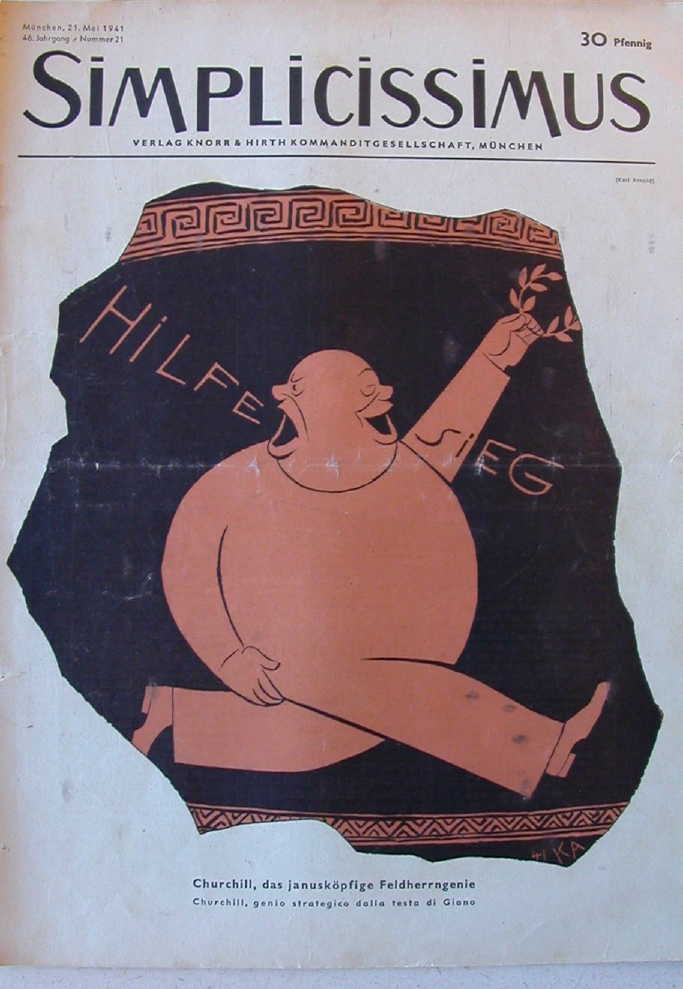
On the same theme, a cartoon titled “Churchill: The brilliant Janus-headed military genius,” has him shouting for help in one direction and announcing victory in the other.
Source: Simplicissimus, #21/1941
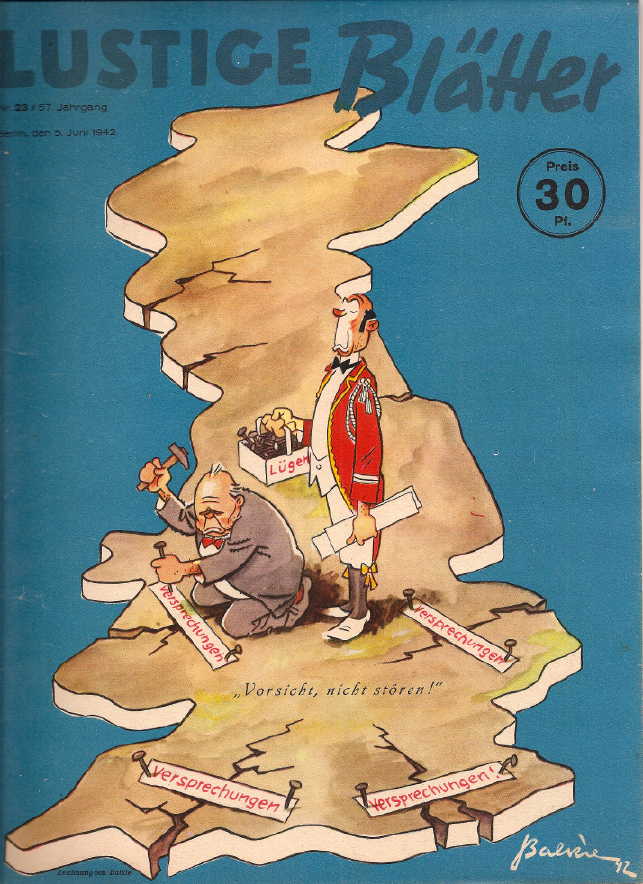
In this June 1941 cartoon, Churchill tries to hold Great Britain together with lies and promises.
Source: Lustige Blätter, #23/1941
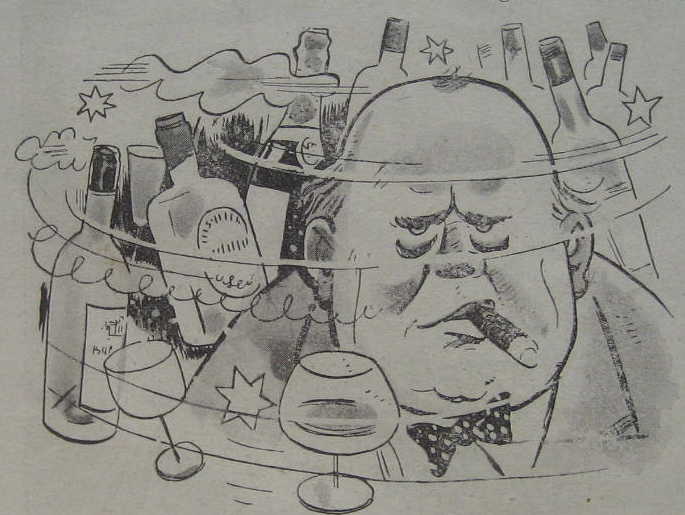
The Nazis often made a point of accusing Churchill of being a drunkard. The accompanying text to this June 1941 cartoon: “We knew the old liar drank a lot, but now we know just how much: ‘He begins the morning with a sherry, then has a bottle of Burgundy with lunch. He often has a glass of port after lunch, but always one after dinner. There is whiskey in the afternoon and Champagne with dinner. Then some more port, and a glass of Cognac. As the night goes on, a whiskey and soda...’” This is apparently taken from an English article.
Source: Illustrierter Beobachter, #25/1941
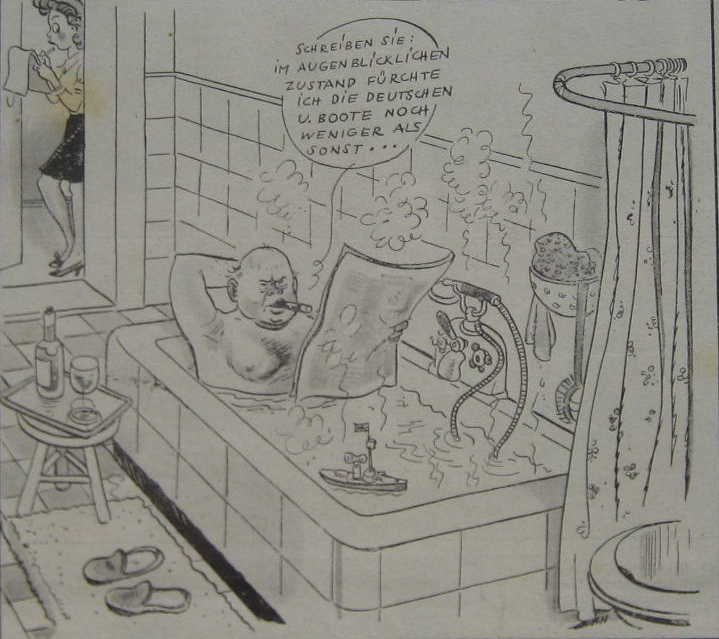
In a cartoon from the same issue, Churchill tells a secretary: “Take this down: In my current situation, I fear German U-boats even less than before...”
Source: Illustrierter Beobachter, #25/1941
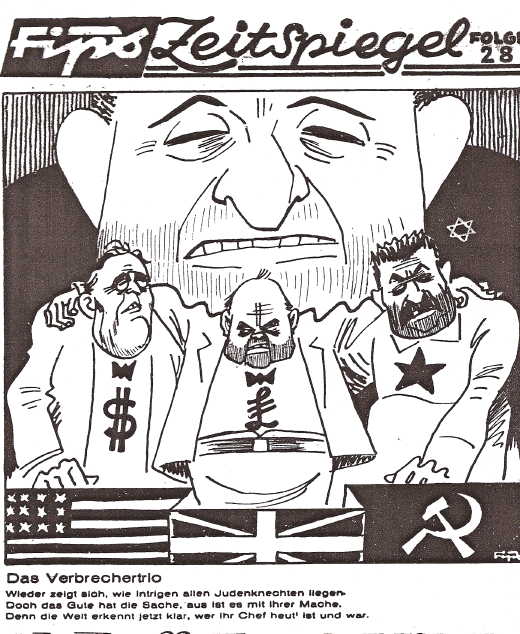
Published after the invasion of the Soviet Union, this cartoon from Der Stürmer is tilted “The Criminal Trio.” A Jew is behind the three Allied leaders. The text states that they make it clear who their chief is today, and always was,
Source: Der Stürmer, #28/1941
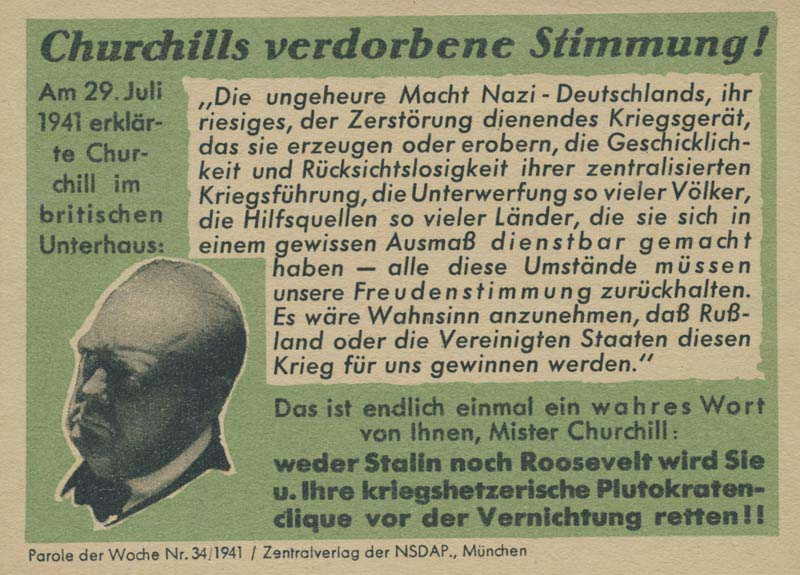
In this August 1941, the weekly poster discussed “Churchill’s strategy of lies.” It cites his false predictions of what would happen in North Africa, and concludes: “Churchill has been using his big-mouthed strategy constantly over the past two years. Before each battle, he screams victory, then leads the British people into one defeat after another with ever more desperate lies. In Germany, however, the Führer works silently at the map of world history. When the time is ripe, he leads the German people to incomparable victories. That is what counts, only that!!” Finally, true words from Mr. Churchill: ‘Neither Stalin nor Roosevelt will save you and your warmongering plutocratic clique from destruction!’”
Source: Parole der Woche, #34/1941 [small edition]
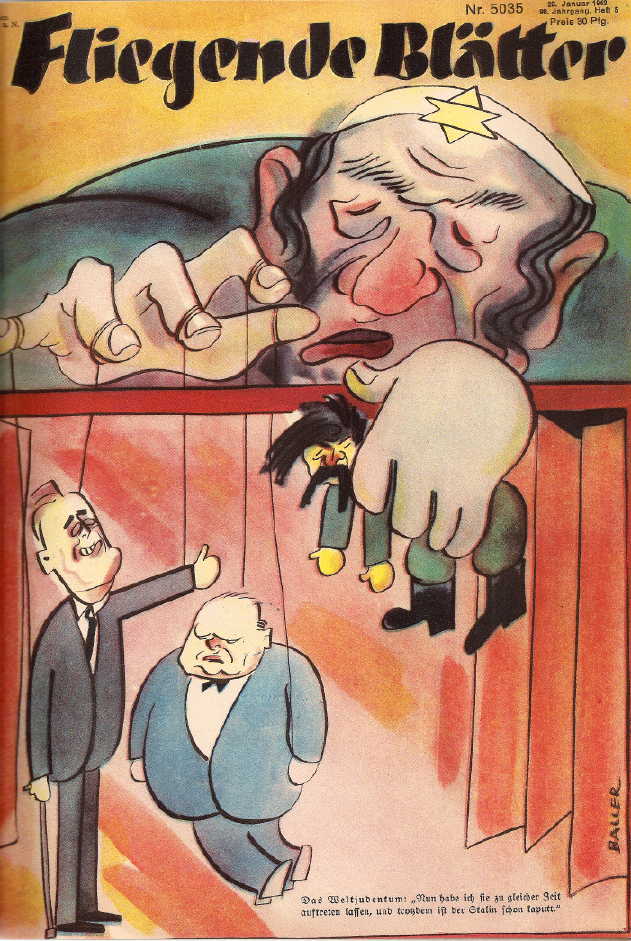
In this January 1942 cartoon from Fliegende Blätter, the frustrated Jewish puppeteer says that he’s just put Stalin on stage, but he was finished already. The remaining puppets are Roosevelt and Churchill.
Source: Fliegende Blätter, #5/1942
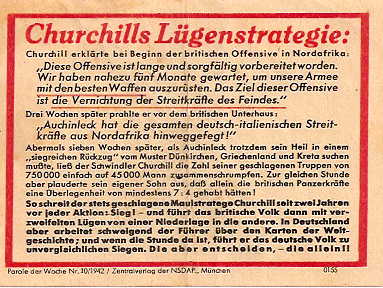
In February 1942, the weekly poster discussed “Churchill’s strategy of lies.” It cites his false predictions of what would happen in North Africa, and concludes: “Churchill has been using his big-mouthed strategy constantly over the past two years. Before each battle, he screams victory, then leads the British people into one defeat after another with ever more desperate lies. In Germany, however, the Führer works silently at the map of world history. When the time is ripe, he leads the German people to incomparable victories. That is what counts, only that!!”
Source: Parole der Woche, #10/1942 [small edition]
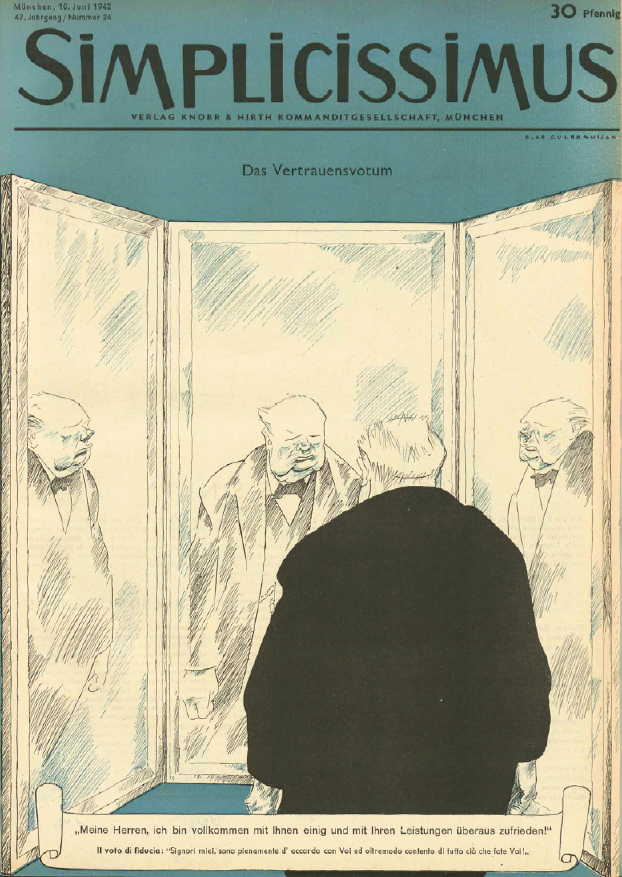
It was always interesting to the Nazis that Churchill had to defend himself in the House of Commons even in the midst of war. This cartoon from June 1942 addresses the theme: “The vote of Confidence. ‘Gentlemen, I agree with you completely, and am entirely satisfied with what you have accomplished.’”
Source: Simplicissimus, #24/1942. I take this from the on-line collection of Simplicissimus.


